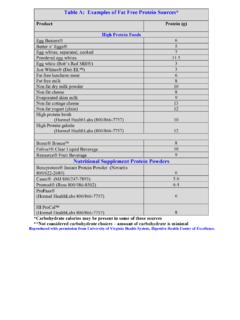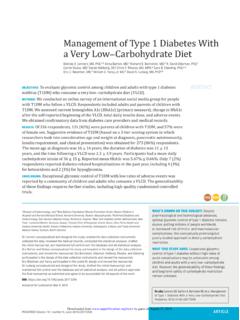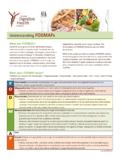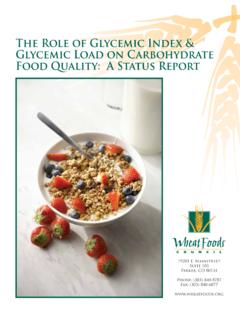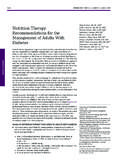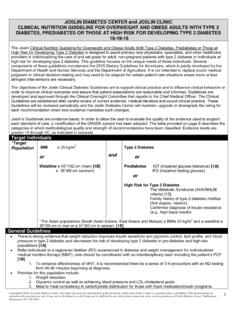Transcription of Best Foods for Diabetes, High Cholesterol, High …
1 Best Foods for diabetes , high cholesterol , high Blood Pressure, and Weight All these conditions involve a genetic sensitivity to refined carbohydrates. In many people, refined carbohydrates leads to abnormally high and low blood sugar levels, a condition called dysglycemia. This information sheet helps you reduce this abnormal response. Did you know that what you eat is a critical determinant of how much you eat? Whether you want to lose weight, or want to maintain your present healthy weight, choosing the right kinds of Foods will help you achieve your goals. Let's leave calorie counting to the mathematicians.
2 If you are overweight, you know what happens when you ask your doctor for help. The usual response is "follow this diet and get more exercise. That doesn't work all by itself, does it? That is because it is based on a partial truth - that the reason people gain weight is that they eat too much and exercise too little. Let's look at the facts. The fact my overweight patients have been telling me for years is "Doc, it's my metabolism." Let s see how and why your food choices influence that metabolism, so that you can know what to eat, and what not to eat, to improve your health and lose weight. First, I suggest you watch our videotape on weight gain.
3 You can borrow it from our receptionist. Here is part of the script for that To help you understand what to do about this kind of metabolism, let me introduce you to Sam. He is just slightly overweight. His genetic makeup doesn't work too well in this modern environment. He has the metabolic condition which predisposes to weight gain. To understand that metabolic condition, come with me on a journey. Take a moment to look at Sam's arm. Now imagine you are journeying into a muscle in his arm, you are becoming smaller and smaller, and finally small enough to see an individual muscle cell. That muscle cell, like all cells, has a membrane.
4 That membrane is a thin layer of oil that surrounds the cell and separates the watery region inside the cell from the watery region outside the cell. Remember hearing that the human Integrative Health Systems, Douwe Rienstra, MD 242 Monroe Street Port Townsend, WA 98368 360 385 5658 body is mostly water? Sam's muscle is mostly water. The contractile tissues inside each muscle cells are surrounded by water, and separated from this watery region outside by this layer of oil, the cell membrane. Now, imagine Sam has eaten a piece of toast.
5 The carbohydrates in that toast are converted to sugar, and carried by his blood stream to the vicinity of this muscle cell. Now they are right near the cell, and the muscle needs to bring them into the cell for fuel. However, sugar does not dissolve in oil as it does in water. Sam solves this problem by secreting some insulin from his pancreas. This insulin will be carried by Sam's blood stream to the vicinity of this muscle cell we are watching, and it will signal this insulin receptor on Sam's muscle cell to bring the sugar into the cell. Only, now we have a new problem, and this is the secret to the metabolism of weight gain.
6 The receptor isn't working right. The insulin signal doesn't work, and the muscle still needs the fuel. So the pancreas makes more insulin. The receptor still doesn't respond, still doesn't let in the sugar. The pancreas makes more insulin. Finally, after the insulin levels outside this cell run up to about ten times normal, the receptor finally gives in and lets the glucose into the cell. You have just seen, up close, the process of insulin resistance. The system designed to move sugar across this oily membrane is not working correctly, and the pancreas has made ten times the normal amount of insulin to get the glucose into the cell.
7 Now, you could ask at this point, What is the problem? We got the glucose into the cell, we can feed that muscle, so what? Well, there is a serious consequence. We've got about ten times too much insulin around this cell and in Sam's bloodstream. This insulin signals the kidney to retain sodium. Sam retains fluid, and gets a little heavier. The insulin tells the fat cells to hold on to their fat, and Sam gets a little heavier still. And finally, all that insulin can drive too much sugar into Sam's cells. And after all this work on the part of his system to get the sugar into the cells, Sam's blood sugar falls, and Sam feels terrible.
8 He may just find himself unexpectedly hungry in the middle of the morning, or he may find that he is weak or unable to think, or he may get a headache, but in any event he doesn't feel as if he just had a great breakfast and is all ready to go to work. And he knows from past experience that if he eats some carbohydrates- a donut, or roll, or toast, or crackers or scones, that he will get back to normal. Because once more he will have sugar coming into his system, and the whole process will start over. Sugar too high , sugar can't get into the cell, pancreas makes more insulin, insulin causes retention of fluids and fat, sugar goes into the cell, and blood sugar goes too low and Sam finds himself hungry again We can call it the "refined carbohydrate-hunger cycle.
9 " So, what advice should we give Sam? We want to give advice that is going to change his metabolism--make his insulin receptors work correctly again, so that the carbohydrates he eats gets into his cells without causing increased insulin levels and the refined carbohydrate-hunger cycle. We're going to tell Sam to increase his exercise, because that will cause his insulin receptors to work better. "Sam, increase your exercise!" "Sam! Can you do that?" Sam doesn't seem to be answering, so we'll have to go on. In real life we'd have to listen to Sam, what he can do and what he can't. Maybe his knees hurt and we'd have to attend to that first.
10 But Sam needs to understand that when he puts his muscle cells under stress, gets them working, they are going to become more sensitive to insulin. So, as I go on, if you are interested in the rest of Sam's prescription, remember that this program might have to be customized a bit to suit you or Sam. In our clinic, we think it is just as important to know about the person who has the medical condition as it is to know about the condition. As you listen to this, I want you to understand the principles. Making it work for you might take some one-on-one counseling about what you are used to doing now and what your taste, habits and lifestyle are.
